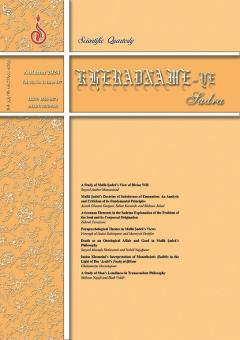A Study of Mullā Ṣadrā’s View of Divine Will
Subject Areas : ملاصدراپژوهی و اندیشۀ حکمت متعالیه
1 - Assistant Professor, Department of Islamic Philosophy and Theology, Allameh Tabataba'i University, Tehran, Iran
Keywords: divine will, God’s attribute, essential attribute, active attribute, Mullā Ṣadrā, knowledge of the most perfect order, doctrine of divine sovereignty,
Abstract :
Mullā Ṣadrā believes that, given the impossibility of occurrence of contingent will to the divine essence, the cause of the creation of things at a particular time is rooted in the divine knowledge of the most perfect and noblest order. Anything that conforms to the noblest order necessarily emanates from God and is the same divine will. Hence, given the return of divine will to the knowledge of the noblest order, this attribute must be considered to be essential rather than active. The present paper, while accepting the bases of Mullā Ṣadrā’s view regarding referring the divine will to the knowledge of the most perfect order, emphasizes the necessity of paying attention to God’s essential free will and ability to quit act. Later the author responds to the most important objections to Mullā Ṣadrā’s idea in this respect and demonstrates that the conceptual variation of the human will and divine will does not negate the idea of attributing the divine will to the knowledge of the noblest order. The active attribution of will is correct in a sense; however, it can never function as a response to the cause of the creation of things at a particular time. The traditions that emphasize the active nature of will can also be interpreted in a way to conform to Mullā Ṣadrā’s doctrine.
